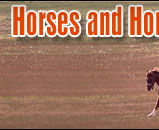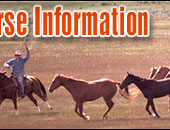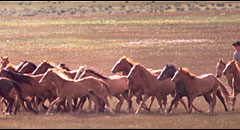 |
   |
|
|
|
You are here: Horses > Horse health > Cribbing & OCD Behavior |
Horse Stable Vices: Equine Cribbing, Chewing, and Nodding
Consider all of the things you do when you are under stress;
twiddling your thumbs, snapping, fiddling with things in
your environment, twirling your hair, shaking your legs. |
|
|
These are all signs of stress--they are all things that
people are known to do when they are under stress, and
surprisingly enough horses are able to exhibit nervousness
through their actions as well. A large portion of horses display signs of obsessive
compulsive disorders--about fifteen percent to give you an
idea. Sometimes these behaviors are called stable vices;
this simply means that the behaviors they exhibit have to do
with their stable environment. |
 Chewing on
their stable blankets, nodding their heads up and down, and
even pawing the ground are signs of equine related OCD.
These are not difficult behaviors to control, but others
are; they are the product of lack of proper training and can
be fixed with the help of proper training. Chewing on
their stable blankets, nodding their heads up and down, and
even pawing the ground are signs of equine related OCD.
These are not difficult behaviors to control, but others
are; they are the product of lack of proper training and can
be fixed with the help of proper training.
Have you ever seen a horse grab a piece of the wood in its
stall and pull on it? Many times this behavior is
accompanied by groaning and grunting, huffing and puffing.
This is called cribbing, and it is not called ‘cribbing’
when horses actually eat the wood in their stalls. Cribbing
is a compulsive behavior of horses that can be quite
expensive; stalls must be repaired and it can lead to
intestinal problems with the horse. This can be a
disqualification for many people who are looking to insure
their horses because it is so bad for their health.
While it is not definitively known just what causes OCD in
equines, there is some evidence that it can be inherited. It
is unlikely that truly OCD behavior is caused by poor
training and handling, because even in large stables, there
are usually only one or two horses that show OCD behaviors
while the rest do not. There is also some evidence that
improper diet and feeding can contribute to OCD behavior.
What can you do to prevent equine OCD? Other than proper
training, spending time with your horses and not confining
them to a barn or stall is a great start. Also, feeding them
crunchier food has also been known to help cribbing, as
surprising as it sounds.
These are closest to the lifestyles of wild horses and wild
horses are never really seen cribbing or performing any
other OCD-related behavior. All they do all day is graze.
In contrast, horses who have been tamed spend a grat deal of
their day in a barn or horse stall, and only a portion of
this time is spent finding and eating food. Empty stomachs
lead ot stress and stress leads to these pulling movements,
which is why cribbing has become such a problem. This is not
to say that cribbing does not occur outdoors, but it does
not usually happen this way.
There are other ways to correct cribbing as well. For
instance, special harnesses can be bought that do not allow
the horse to crib; they restrict the movement of the muscles
necessary to do so. Also, sometimes veterinarians may be
able to alter the muscles of the horse to restrict it from
cribbing, but this is not usally recommended.
There has been research on medications that can restrict
cribbing. Certai medications reduce stress, which reduces
the likelihood of cribbing. Injectable drugs may also help
to reduce cribbing, but anti depressants seem to be the most
effective medication for this problem.

|
Read the next horse health tips article on Hind limb interference. |
|
|
|
|
 |
|
|
|
|
|
Horse Education
|
|
|
|
|
Horse Information Topics
|
|
|
|
|
|
|
|
Horse Business Owners
|
| |
Advertise with Us
Have your horse products or services exposed to over 27,000 of our monthly visitors.
|
|
|
|
|
|